LEAP Announces Animal Legal Theory Speaker Series

The Law, Ethics & Animals Program4 (LEAP) at Yale Law School has announced this spring’s speaker series. Last semester’s guests showcased how science, journalism, activism, and other fields contribute to the animal protection movement. This spring, the program is homing in on a topic close to LEAP's core mission: how the legal system fails animals, and how it can be made better. The series will tackle major questions about how the law and legal institutions interact with animals, the history of animal law, and what change can look like in the short, medium, and long terms. LEAP thanks the Brooks Animal Studies Academic Network for their support of the speaker series.
The series kicks off on Thursday, Feb. 3, 2022, with a look at animal representation in legal systems, featuring University of Victoria’s Maneesha Deckha. The other events this spring will explore such topics as the complicated nature of sentience in moral philosophy, how unwritten constitutional law fails animals and marginalized humans alike, and how international legal systems could be leveraged to implement animal protection. You can read more about all of our events (and register for them) below.
Animals as Legal Beings, with Maneesha Deckha
Thursday, Feb. 3, 12:15 p.m.–1:15 p.m. ET
Register for the webinar: tinyurl.com/leap-deckha5
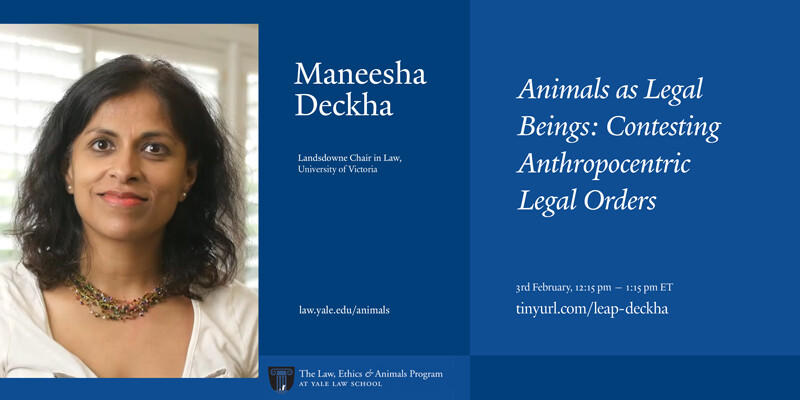
Maneesha Deckha6 is the Lansdowne Chair in Law at the University of Victoria Faculty of Law, where she directs the Animals and Society Research Initiative. She works at the crossroads of animal, feminist, and postcolonial legal studies.
Sentience is More Complicated Than You Think, with Dale Jamieson
Thursday, Feb. 17, 12:15 p.m.–1:15 p.m. ET
Register for the webinar: tinyurl.com/leap-jamieson8
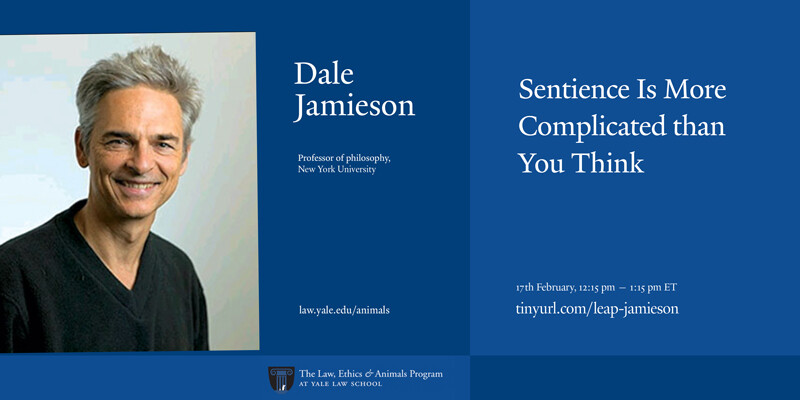
Dale Jamieson9 is Professor of Environmental Studies and Philosophy; Affiliated Professor of Law; Affiliated Professor of Medical Ethics; Associated Faculty, Center for Bioethics; and Founding Director of the Center for Environmental and Animal Protection, at New York University. In 2016 he was awarded the Association of Environmental Studies and Sciences William R. Freudenburg Lifetime Achievement Award. He has been thinking seriously about animals since the early 1970s when his dissertation supervisor, Paul Ziff, made him read Konrad Lorenz and Niko Tinbergen in order to write a dissertation in philosophy of language, since “human linguistic behavior is just a branch of animal behavior;” and he met Tom Regan who had written, but not yet published, his first paper on animals, “The Moral Basis of Vegetarianism.” He has been thinking about science and why it matters even longer.
Animals and the Unwritten Constitution, with Jessica Eisen
Thursday, Feb. 24, 12:15 p.m.–1:15 p.m. ET
Register for the webinar link: tinyurl.com/leap-eisen10
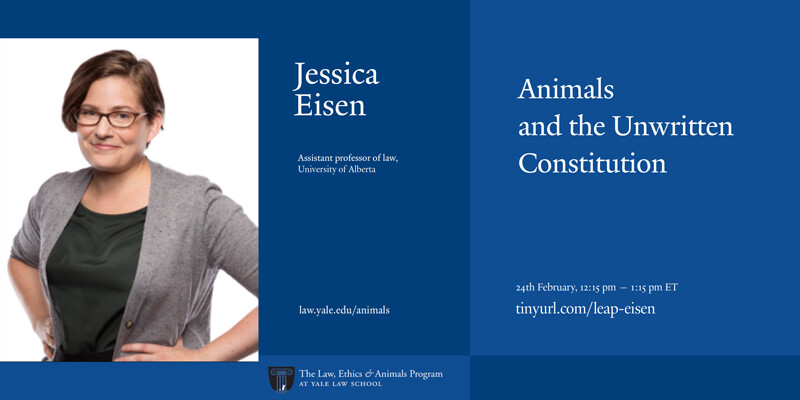
Jessica Eisen11 is an assistant professor of law at the University of Alberta. Her research interests include animals and the law, constitutional and comparative constitutional law, equality and antidiscrimination law, feminist legal theory, intergenerational justice, and law and social movements. She is the author of “Feminist Jurisprudence for Farmed Animals12” in the Canadian Journal of Comparative and Contemporary Law, “Milked: Nature, Necessity, and American Law13” in the Berkeley Journal of Gender, Law, & Justice and “Animals in the Constitutional State14” in I.CON: The International Journal of Constitutional Law.
The Quasi-Property, Quasi-Person Aapproach to Animals in the Legal System, with Angela Fernandez
Wednesday, March 9, 12:15 p.m.–1:15 p.m. ET
Register for the webinar link: tinyurl.com/leap-fernandez15
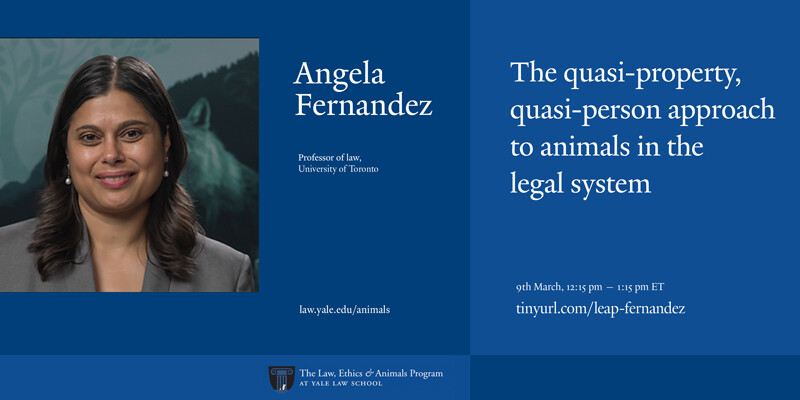
Angela Fernandez16 is a professor of law at the University of Toronto, with a cross-appointment in the Department of History. She is the author of Pierson v. Post, the Hunt for the Fox: Law and Professionalization in American Legal Culture17. She sits on the Board of Advisors and is a Director of Animal Justice Canada.
Animal Crisis: A Book Talk with Lori Gruen and Alice Crary
Thursday, March 31, 12:15 p.m.–1:15 p.m. ET
Register for the webinar link: tinyurl.com/leap-animal-crisis18
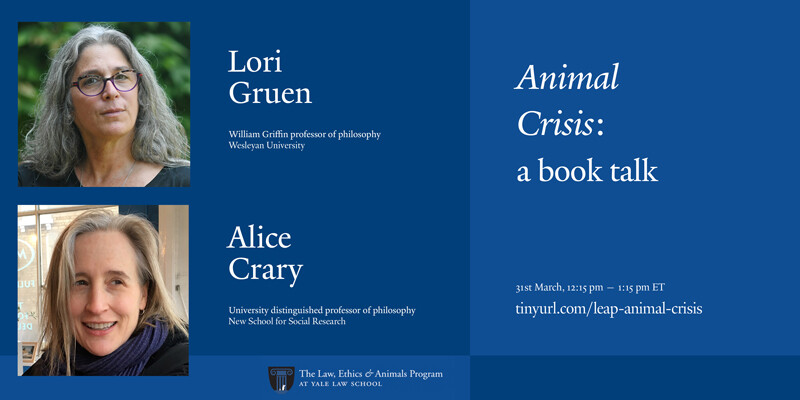
Lori Gruen22 is the William Griffin Professor of Philosophy and Professor of Feminist, Gender, and Sexuality Studies and Science in Society at Wesleyan University. She coordinates Wesleyan Animal Studies and is the author of numerous books, including Ethics and Animals, Ecofeminism, and Entangled Empathy.
Alice Crary23 is a University Distinguished Professor of Philosophy at the New School for Social Research. Her research areas included moral philosophy, critical theory, and critical animal studies, and her published works include Beyond Moral Judgement and Inside Ethics: On the Demands of Moral Thought.
Convention on Animal Protection: A Global Treaty for Animal Welfare, Public Health, and the Environment
Thursday, April 14, 12:15 p.m.–1:15 p.m. ET
Register here for the webinar: tinyurl.com/leap-cap24
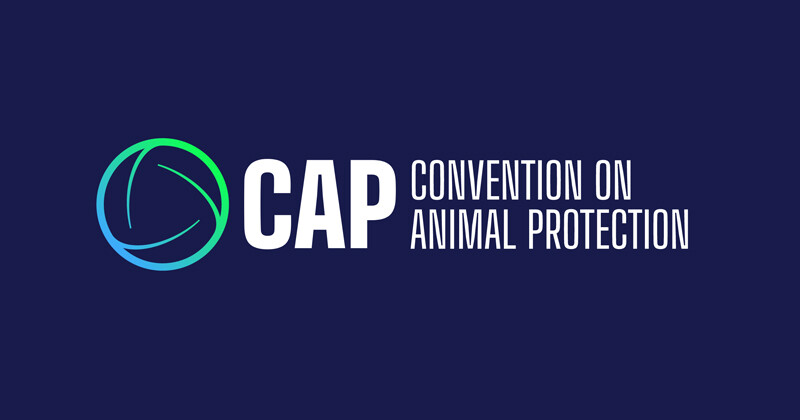
Nigel Blackaby QC is a partner at the international law firm Freshfields Bruckhaus Deringer in Washington, D.C. where he is the global co-head of Freshfields’ international arbitration practice group as well as its Latin America practice group. He has acted as counsel and arbitrator in over 100 ad hoc and institutional arbitrations conducted in English and Spanish, including over 30 investment arbitrations.
David Favre is a professor of law at Michigan State University College. He served as Dean of the College for five years and continues to teach in the area of property law, animal law, and international environmental law. Professor Favre has written a number of articles and books dealing with animal issues including such topics as animal cruelty, wildlife law, animal rights, ethics of animal use, and international control of animal trade.
Rajesh K. Reddy directs the Global Animal Law and Animal Law Advanced Degree Programs at the Center for Animal Law Studies at Lewis & Clark Law School. He chairs the International Subcommittee of the Animal Law Section of the American Bar Association and serves as a board member for Minding Animals International. He has advanced human and nonhuman animal interests as part of his work for the Animal Legal Defense Fund and the Human Rights Law Network in New Delhi, India.
Joan Schaffner is a professor of law at George Washington Law School, where ze directs the GW Law Animal Welfare Pro Bono Project. Ze has presented on animal law panels and conferences world-wide and is the author of the book Introduction to Animals and the Law and of several book chapters, including “Valuing Nature in Environmental Law: Lessons for Animal Law and the Valuation of Animals” in What Can Animal Law Learn from Environmental Law? and “Value, wild animals and law” in Animal Welfare and International Environmental Law: From Conservation to Compassion.


